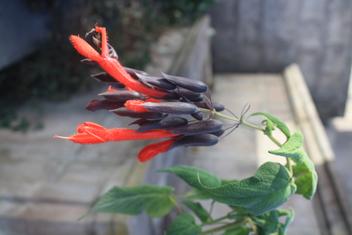Giant Bolivian Sage
(Salvia dombeyi)
Giant Bolivian Sage (Salvia dombeyi)
/
/

Maya Stanfield-Mazzi
CC BY-SA 4.0
Image By:
Maya Stanfield-Mazzi
Recorded By:
Copyright:
CC BY-SA 4.0
Copyright Notice:
Photo by: Maya Stanfield-Mazzi | License Type: CC BY-SA 4.0 | License URL: https://creativecommons.org/licenses/by-sa/4.0 | Uploader: Nimbaselama | Publisher: Wikipedia Commons






Estimated Native Range
Summary
Salvia dombeyi, commonly known as Giant Bolivian Sage, is a tender perennial plant that can function as a subshrub or vine, native to the high-altitude montane forests and scrublands of the Andes in South America, particularly in Peru. It thrives at elevations around 3000 meters where it benefits from the cool, moist conditions. This species typically climbs from 3–6 meters with proper support, showcasing its vining habit. The heart-shaped dark green leaves are notable for their long petiole and short hairs, adding a textural element to the plant’s appearance.
The Giant Bolivian Sage is celebrated for its strikingly large flowers, which are among the largest in the genus Salvia. The blooms feature a 4 cm currant-red calyx and a 9 cm scarlet corolla, creating a dramatic display in summer and fall. The flowers are highly ornamental and attract hummingbirds and other pollinators, making it a valuable addition to wildlife gardens. Despite its H2 hardiness rating, indicating some vulnerability to cold, it is a resilient plant when given a sheltered position. It is often used in borders, as a climbing plant on trellises, and in conservatories. For optimal growth, it requires full sun to partial shade, medium to high amounts of water, and well-drained soil. While it tolerates low temperatures, it cannot withstand freezing, so in cooler climates, it should be grown in pots and brought indoors or provided with winter protection.CC BY-SA 4.0
The Giant Bolivian Sage is celebrated for its strikingly large flowers, which are among the largest in the genus Salvia. The blooms feature a 4 cm currant-red calyx and a 9 cm scarlet corolla, creating a dramatic display in summer and fall. The flowers are highly ornamental and attract hummingbirds and other pollinators, making it a valuable addition to wildlife gardens. Despite its H2 hardiness rating, indicating some vulnerability to cold, it is a resilient plant when given a sheltered position. It is often used in borders, as a climbing plant on trellises, and in conservatories. For optimal growth, it requires full sun to partial shade, medium to high amounts of water, and well-drained soil. While it tolerates low temperatures, it cannot withstand freezing, so in cooler climates, it should be grown in pots and brought indoors or provided with winter protection.CC BY-SA 4.0
Plant Description
- Plant Type: Shrub, Vine
- Height: 6-8 feet
- Width: 6-8 feet
- Growth Rate: Moderate
- Flower Color: Purple, Red
- Flowering Season: Summer, Fall
- Leaf Retention: Semi-deciduous
Growth Requirements
- Sun: Full Sun, Part Shade
- Water: Medium, High
- Drainage: Medium
Common Uses
Bee Garden, Bird Garden, Butterfly Garden, Deer Resistant, Drought Tolerant, Fragrant, Hummingbird Garden, Rabbit Resistant, Showy Flowers
Natural Habitat
High-altitude montane forests and scrublands of the Andes
Other Names
Common Names:
Scientific Names: , Salvia dombeyi,
GBIF Accepted Name: Salvia dombeyi Epling